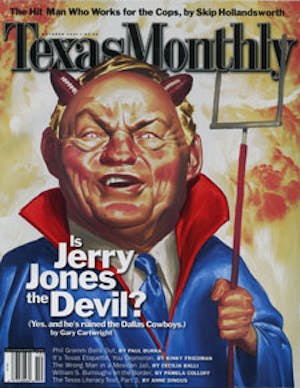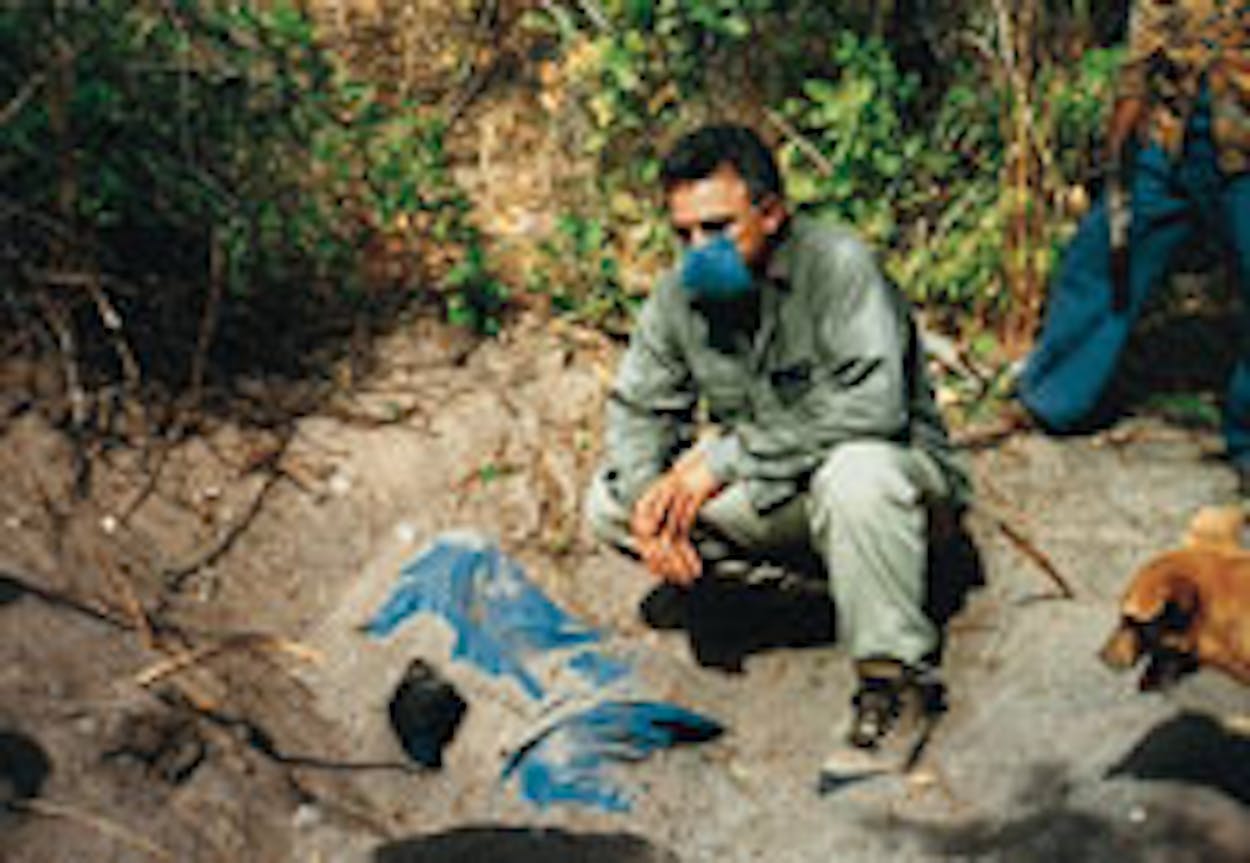It was a pleasant, mild December day in San Antonio almost three years ago when Bob Rivard’s life changed. At the time, he was taking a golf lesson with the general manager and the publisher of the San Antonio Express-News, the newspaper he edits. Rivard had heard two days before that his paper’s Mexico City bureau chief, Philip True, was missing in the mountains of west central Mexico. He had dispatched one of his reporters to find him. But he couldn’t get True out of his mind. Now he made a more difficult decision: Against the advice of his associates, he would go to Mexico and find Philip True himself.
True had been on vacation, taking a solo one-hundred-mile hike through remote territory populated by 20,000 Huichol Indians. True knew the Huichols were perhaps the least assimilated and most undisturbed of all the indigenous peoples in Mexico. He wanted badly to write about them. But he had been rebuffed by his editors, so he decided to learn more on his own time.
He had been gone for thirteen days—longer than the trip was to have lasted—and had failed to check in with his wife from the fourth village on his route, one that she knew had a pay phone. He had never failed to check in before. His wife, Martha, in Mexico City and pregnant with the couple’s first child, telephoned the Express-News, reaching Susana Hayward, a reporter who had recently covered Mexico City for the Associated Press. Rivard then sent Hayward to Guadalajara to join Martha’s brother-in-law Manuel Obaya and True’s best friend, Fred Chase, in their search for True. In a rented plane and using the detailed map True had given to his wife, they combed an isolated area straddling the border between the states of Nayarit and Jalisco. They landed in several villages, including Almotita, where the Indians were openly hostile. Yes, they’d seen True, one villager said. His legs had been bleeding because dogs had attacked him. Something about the story didn’t seem right.
By then, Rivard was in Mexico City, determined to help Hayward and the others track down True. As it happened, he was uniquely qualified to do so. He was a veteran correspondent with both a taste for exotic adventure and the ability to speak Spanish fluently. His coverage of the guerrilla wars in El Salvador and Guatemala and the Sandinistas in Nicaragua for the Dallas Times Herald and Newsweek in the eighties was considered first-rate. Eventually he became Newsweek‘s chief of correspondents. His south-of-the-border credentials were so good that in 1999, after two years as the editor of the Express-News, he was offered the job of editor of the Miami Herald, the most important English-language newspaper in Latin America. He declined, persuaded to stay in San Antonio by promises made by the Hearst Corporation (which owns the Express-News) to increase his salary and let him hire more reporters to write longer, more literary pieces.
Rivard began leveraging every personal and professional contact he and the paper had in Mexico, working his way up the chain of command to Fernando Lerdo de Tejeda, President Ernesto Zedillo’s minister of social communications. The Cabinet officer asked Rivard what he wanted.
“I want you to treat this like Senator Kennedy’s son is missing,” Rivard said. “We want that same kind of resource allocation.”
Perhaps True had been hurt, making it difficult to walk, Rivard theorized. Or, even though True was an experienced hiker, he could have gotten lost in the unfamiliar terrain. Lerdo de Tejeda then spoke with the minister of defense, and by the end of the next day, Rivard was flying into Guadalajara to meet the army general in command of the region. A massive public information campaign was launched. Hundreds of leaflets offering a 10,000-peso reward were distributed to the villages. The Huichols’ radio network, broadcasting in both Huichol and Spanish, made announcements every hour. “I don’t think there was a Huichol on earth who didn’t know we were looking for a foreigner named Philip True,” Rivard says.
Then came a break: A Huichol hunter named Margarito Díaz walked two days to tell the search party that he had found a body between two villages. The general’s helicopter, containing Rivard, Chase, and Díaz, took fifteen minutes to fly near the spot, which was in a steep ravine. The body was no longer there, but there was clotted blood in the dirt. Rivard then followed a trail of feathers from True’s sleeping bag to the bottom of the canyon. “A dog ran up to a sandbank and started to dig and sniff,” says Rivard. “You could smell death. Fred and I got down on our hands and knees and started to dig in the sand.” They found Philip True’s body stuffed in his sleeping bag, his bandanna knotted tightly around his neck. The gruesome discovery provided some closure for True’s family and friends, but having found True, they now sought justice.
Shortly after True’s body was found, two Huichol Indians, Juan Chivarra de la Cruz and his brother-in-law Miguel Hernández de la Cruz, were charged with his murder. The last entry in True’s diary spoke of an unpleasant encounter with an Indian named Juan who had threatened to take him to jail and had asked True to follow him to his village, where True evidently spent the night. True’s binoculars, camera, and backpack with his personal papers were found in Chivarra’s home. The suspects quickly confessed to the killing, providing the police with details that only True’s attackers could have known. Their reasons were vague: at various times they said True had taken photographs of sacred sites, insulted Chivarra by calling him a veterinarian, and barged into Chivarra’s abode and beat him up while drunk, then raped his wife.
After the two were apprehended, Rivard—who is convinced of their guilt—tried to speed the murder trial through Mexico’s balky judicial system. In February of this year, he met personally with President Vicente Fox and with officials from Fox’s new administration, just as he had met with the State Department, three judges who have presided over the case, and four prosecutors. He enlisted journalistic organizations in the United States and Mexico to speak out on True’s behalf.
But he was up against more than just bureaucratic intransigence. Two months earlier an American expatriate from Atlanta named Miguel Gatins had taken an interest in the case. Gatins, who lives in Guadalajara, felt that Chivarra and Hernández were unable to defend themselves because of their status as poor, indigenous people. He financed a legal team that rolled out a parade of expert witnesses who said that the Indians had been tortured into confessing. They also presented findings of a third autopsy, which concluded that Philip True had not been strangled (though by then the corpse was so disfigured from previous autopsies that there was no neck on the cadaver to examine) but instead had accidentally fallen to his death while staggering around drunk. On the strength of this new evidence, the accused were released by a county judge in Jalisco in early August.
When Rivard heard the news, he returned to Mexico, meeting with Martha True and securing the support of Jeff Davidow, the United States ambassador to Mexico. Davidow said, “The evidence strongly indicates foul play”—pointed words coming from a diplomat. Rivard met with Fox’s top legal adviser, who, Rivard says, shared his disbelief. (“To this day, the court has not notified Philip’s widow or this newspaper about the acquittal,” Rivard says.)
He held a press conference to remind the Mexican press, including those papers siding with the Indians against the gringos, that True’s plight was also theirs. “The Mexican press was having a field day,” he says. “‘Drunk American hiker dies. We win. America loses.’ We tried to point out this was not a soccer game, with a winner and a loser. Philip’s not getting special treatment. There are many journalists in Mexico who’ve died. It’s in their interest to seek the truth.”
Gatins, meanwhile, has hailed the Indians’ release as a “great victory for justice.” The Huichols, he said, had been treated like “the classic scapegoats: Indians with no connections, no money, up against the power of the press and American institutions.” Bob Rivard sees it differently. “This man, like some other people here, [has] an attitude that ‘They’re Indians; they can’t possibly be guilty of homicide.’ That’s a quite romantic view. We’ve always been emotionally prepared that the Huichols would not pay for their actions. But we weren’t prepared for the judge’s finding that True’s death was accidental.”
The case is still alive. Prosecutors have filed a final appeal of the acquittal before a panel of three state judges. The Express-News has continued its coverage. In one story, the paper profiled Gatins, who spent $30,000 to finance the legal team that freed the Indians. In another, it wrote about the suspects, Chivarra and Hernández, both of whom now deny killing True. Back in San Antonio, Rivard, whose newspaper is seeing to it that Martha True and her son are financially taken care of, is trying to concentrate on his main job. “We’d like to get the Philip True case behind us and focus on the newspaper,” he admits. But he’d like a better legacy than the official Mexican version—a drunk gringo stumbling around, beating up Indians, raping their wives, falling off a mountain. You get the sense Bob Rivard sees himself in Philip True, before he crossed over into management. “It meant a lot to me because he was a writer willing to go to the mountains to get his story, use his vacation time to do the work so he could sell it to us,” he says. “How many reporters have hammered away at their editors and weren’t able to get them to see their genius? You ask again and again, and if you still believe in it, you just go do it. Which is what he was doing. What I’m doing is what any editor should do. The staff should expect their editor to be passionate. If not the editor, then who?”








